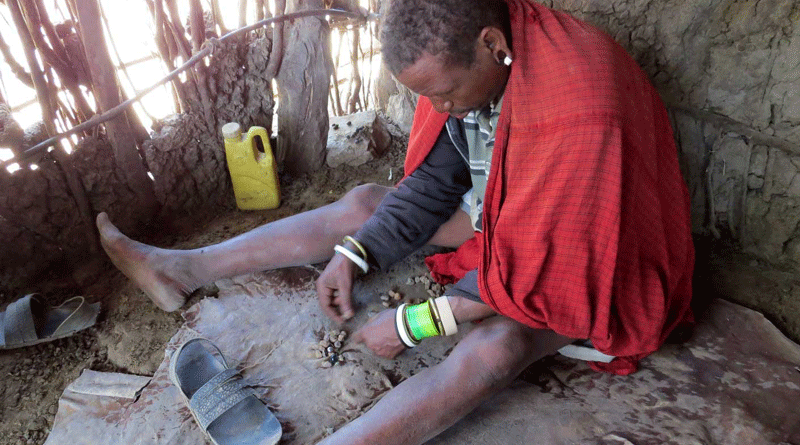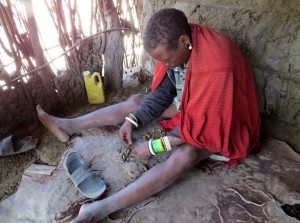READING THE FUTURE IN A MUD HUT
The Hadzabe way of life has changed very little, although since the 18th century they have come into increasing contact with farming and herding people entering their lands. These interactions were often hostile and have led to a severe decline in population. It is believed there are fewer than 1,000 Hadzabe left – although recently their numbers have been increasing slightly.
The first European contact was in the late 19th century and since then there have been many attempts by successive colonial administrations, the independent Tanzanian government, and foreign missionaries to settle the Hadzabe by introducing farming, housing, schooling and Christianity. On the whole, these have failed, and many Hadzabe still pursue a similar way of life as their ancestors.
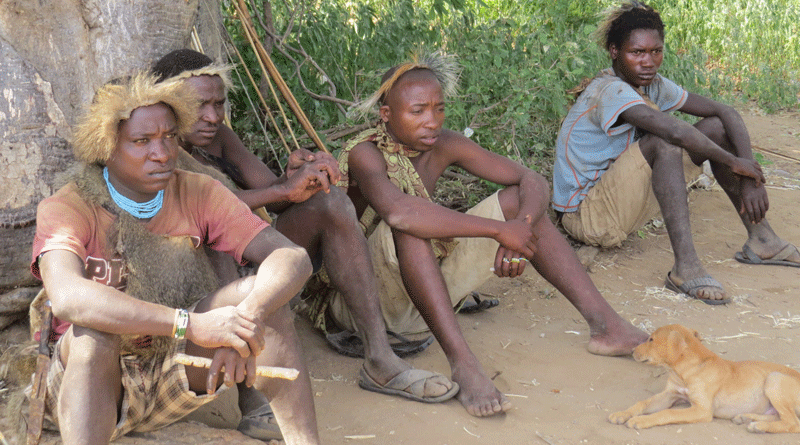
In order to protect their land and way of life the Lake Eyasi conservation area is open to tourists as part of the Tanzanian Cultural Tourism Programme. You pay a fee to enter the area and this money is used to help both the Hadzabe and their neighbours the Datooga. In the past tourists would visit and bring pens, clothes, chocolate and plastic bottles of water – none of which the people need or want. And worse – they end up as litter in the landscape. So this fee based entry system is considered a better alternative. However – in reality this has its down-sides too.
When you visit the Hadzabe they are keen to show you their way of life and their hunting skills (not for the squeamish) and to share some of their meat with you (not one for the vegetarians – who can opt instead to try some of the local berries and the dried fruit of the Baobab tree).
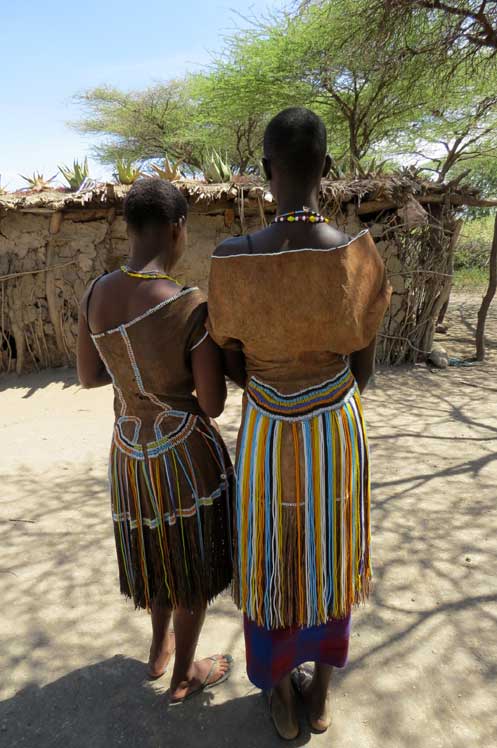
The Datooga are quite different and provide an interesting contrast. Known as the Mang’ati in Swahili, they are a pastoralist people, originally from Sudan and now living in the Manyara Region of Tanzania – including around Lake Eyasi.
They have developed blacksmithing skills and trade with the Hadzabe – swapping metal arrow heads for honey.
A visit to their village will give you an opportunity to meet their women decked out in gorgeous dresses of leather and colourful beads. The underskirt is donned at marriage and never removed again – even to bathe. Their friendly smiles lead you around the village showing you how they grind the maize between two large rocks and welcoming you into their tiny bedroom with the skin bed and small stone fire.
The men of the village are keen to show us their blacksmith skills as they melt a chunk of bronze over the fire and then pour it into a mould before hammering it into a perfectly smooth bangle. The woman are given these bangles as wedding presents and, of course, as a tourist you can purchase your own (which we did – as they are very pretty).
All our conversations are thro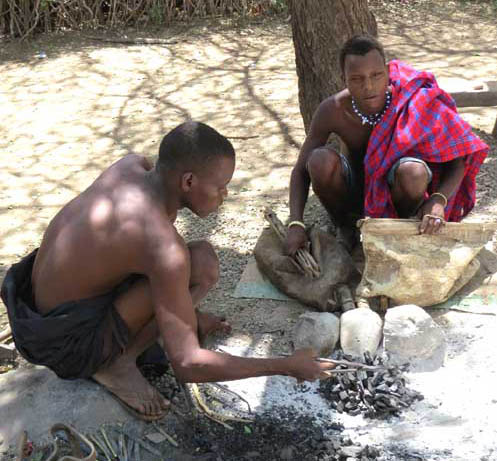 ugh our interpreter/guide (an enthusiastic and knowledgeable young man called Hassani) so it’s difficult to build much rapport – especially as there are no common cultural references. So I asked if the chief of the village would read my fortune. He readily agreed and I joined him in a tiny hut; him sitting on the floor, me on an upturned bucket.
ugh our interpreter/guide (an enthusiastic and knowledgeable young man called Hassani) so it’s difficult to build much rapport – especially as there are no common cultural references. So I asked if the chief of the village would read my fortune. He readily agreed and I joined him in a tiny hut; him sitting on the floor, me on an upturned bucket.
He gathered a handful of small stones and said my name a few times and spat on the stones, then began counting them. It was difficult to determine the rationale for the counting and what this meant but he seemed to be picking up an accurate thread; he said I’d had a bad stomach (true; a few days before I’d had food poisoning), that I lived in a house that had another house on top (it took us a while to understand this but eventually we realised that he meant my house had two storeys (true) which to him is like one house on top of the other), and that my front door faced west (also true).
We chatted for quite a while as he told me tidbits about myself and my future. I have no idea if any of it will come true – but that’s not the point. It was a wonderful opportunity to ‘bond’ with someone with whom it would usually be difficult to find a common reference point.
I offered to read his palm in return – which he was keen for me to do. He nodded enthusiastically as my findings were translated and we both laughed at the incongruous nature of this interaction. It was a first for us both; he’d never read the fortune of a foreigner and I’ve never read the palm of a village chief.
It’s these sorts of encounters that highlight our similarities and remind us that we are all just people – whether we live in a hut in Lake Eyasi or a house in Morden. This is where tourism can be a force for good – and an opportunity to create memories for life.
FACT BOX
Travelling with an ethical safari company can help ensure your money is having a positive impact on local people. Check out Tropical Trails which has an ethos of empowerment and giving back to the community.
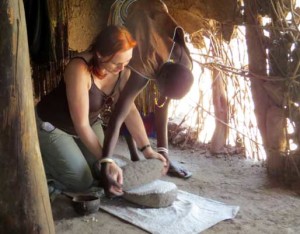
About the Author:
Chantal Cooke is an award winning journalist and broadcaster with a passion for the planet. In 2002 she co-founded the award winning radio station PASSION for the PLANET and in 2009 Chantal was awarded London Leader in Sustainability status. Chantal also runs a successful communications agency – Panpathic Communications.

